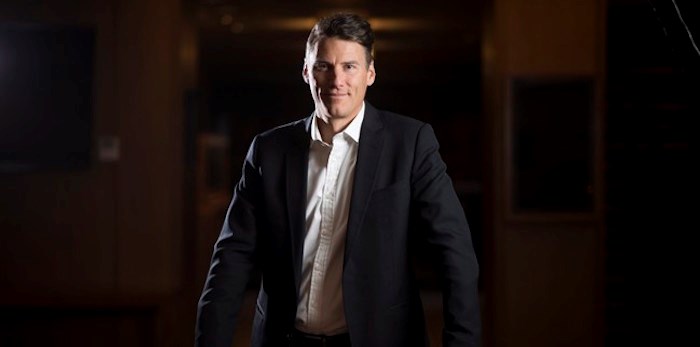After 10 years leading British Columbia's largest city, Gregor Robertson is preparing to step away from the helm.
Whatever the outgoing mayor set out to achieve for Â鶹´«Ã½Ó³»has largely been overshadowed by his role piloting the city through some of its greatest trials.
Sitting in the ceremonial room where he has hosted countless meetings, Robertson said he's comfortable with any lens people choose to view his performance.
 Outgoing mayor Gregor Robertson is pictured outside his office at City Hall in Vancouver, Thursday, Oct. 4, 2018. After 10 years leading British Columbia’s largest city, Robertson is preparing to step away from the helm. THE CANADIAN PRESS/Jonathan Hayward
Outgoing mayor Gregor Robertson is pictured outside his office at City Hall in Vancouver, Thursday, Oct. 4, 2018. After 10 years leading British Columbia’s largest city, Robertson is preparing to step away from the helm. THE CANADIAN PRESS/Jonathan Hayward
"Collectively we've achieved a lot of great successes. But generally in politics and particularly being the mayor, you end up being in the blame game for when things do go wrong. And when there are global challenges, like affordability, that are hitting every big city in the world and hitting us particularly hard, people want to blame me for that," Robertson, 54, said.
"That's OK, I can handle it."
A decade ago, Robertson had a clear vision for achievement: Make Â鶹´«Ã½Ó³»the greenest city in the world by 2020, end homelessness by 2015, increase affordable housing and strengthen the economy.
In fact, Robertson and his council managed to achieve, or at least make dents in, many of those goals.
The unemployment rate is among the lowest in the country at 4.5 per cent. Robertson said more than half of residents use transportation other than cars, an objective that he said was reached five years ahead of schedule in 2015.
Gordon Price, who was a Â鶹´«Ã½Ó³»councillor for six terms and is the former director for The City Program at Simon Fraser University, said when a political promise is checked off the list it doesn't often come with gold stars from voters.
"In a sense, when you were elected to do something and you actually do it, the big response is 'yawn,' " Price said.
What Robertson didn't anticipate was the scale of multiple crises that would knock some of Vancouver's most vulnerable down and change the very character of the city.
The year he took office, the global economic recession hit. Four years ago, people began dying from overdoses in unprecedented numbers. In the last decade, rising property values made the city unaffordable for many.
Each presented an obstacle, taken together, they have overwhelmed the city, Robertson said.
"People are dying in unprecedented numbers, that's been really difficult. You know the bigger, longer crisis of affordable housing was decades in the making and then we got walloped with the biggest influx of global capital really that any city had seen all at once."
Political scientist David Moscrop, who recently left B.C. for the department of communications at the University of Ottawa, said Robertson promised too much in certain areas like homelessness.
In 2018, the number of Vancouverites facing homelessness was pegged at 2,181, over 1,500 were living in shelters or other centres and 659 were living on the street. In 2010, just over 1,700 homeless were counted in the city.
Moscrop said it's unfair to put all of the blame for such problems on local governments when they require a co-ordinated response from their provincial and federal counterparts.
On balance, Moscrop said Robertson did "fine" and given the challenges, he's not sure anyone could have done better.
"I think he's about as good as he could be within the context he was operating," Moscrop said.
Moscrop predicted another tough few years for the city.
"I don't think there's any doubt he's leaving it in worse shape than he found it. But I'm not convinced the next mayor will necessarily be able to address these problems either," he said.
However, Moscrop said the next council will have the benefit of working with other levels of government that are now "willing to play ball."
Financially, Robertson said Â鶹´«Ã½Ó³»is in better shape than its ever been.
Rental housing accounted for more than half of the developments approved this year, he said, compared with 10 years ago when it made up five per cent of the supply.
"The new council and mayor, they're going to have to keep going. This is going to take years," Robertson said.
The city also has a history of "bouncing back," he said, pointing to the way the community came together to clean up after the Stanley Cup riots in 2011.
"I think as a city we've gotten a lot more resilient and closer in terms of dealing with these challenges."
As for what's on the horizon, Robertson plans to take his first long vacation in about 20 years this winter.
"I'm ready for a break from politics," he said. "Basically, I won't be responsible for the city anymore so I need to transition out of that mindset and open my eyes to what I want to do next."
![]()


